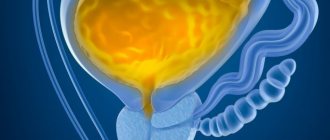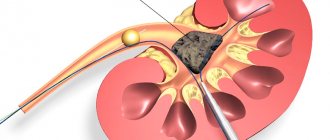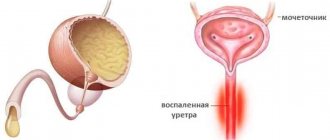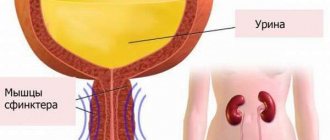Weak stream of urine when urinating: what is the pathology?
A weak intermittent stream during urination in men is one of the most common symptoms in many urological diseases.
Unfortunately, not all patients pay attention to this sign, hoping that the situation will normalize on its own. In fact, the weakening of the urine stream can be dangerous. Problems with urination can occur in many diseases
In women, this symptom is much less common. Drip, intermittent and sluggish urination most often indicates serious disorders in the genitourinary system. Therefore, you cannot hesitate to contact a specialized specialist.
Frequent urge to urinate and weak urine pressure may be signs of prostatitis or prostate adenoma. It is important to know that prostatitis and prostate adenoma are diseases associated with age-related changes and caused by hormonal phenomena. With age, a man experiences a decrease in testosterone (male hormone) and an increase in estrogen (female hormone), these factors lead to an enlargement of the prostate gland.
An enlarged prostate gland compresses the urethra and reduces the pressure of the urine stream. This pathology is called prostate adenoma and is a benign formation. If you consult a doctor on time and begin to treat the disease as soon as the first symptoms appear, you can stop the enlargement of the prostate gland and avoid problems that may arise in the future.
Also, the cause of an enlarged prostate and problems with urination may be a more serious disease - prostate cancer. Statistics show that every 7 men over the age of 50 develop prostate cancer. Prostate cancer is a malignant tumor that usually develops from the tissue of the prostate glands. This type of tumor is difficult to treat due to its high ability to form metastases.
Treatment of a weak stream of urine in men should be selected for each patient individually, depending on the specific disease that caused this symptom, its root cause, the degree of neglect and the form of the disease. The doctor also takes into account the patient’s age and the presence of severe chronic diseases.
If a weak stream of urine in men is caused by prostatitis and is accompanied by difficulty emptying the bladder, the person is prescribed anti-inflammatory drug therapy. If necessary, the attending physician may recommend hormonal treatment, antibiotics, etc. to the patient.
Therapy depends on the specific factor that caused the disease (infection, hypothermia, etc.). A weak stream of urine in men, which was caused by prostate adenoma, is treated with massage, medications, exercise therapy and physiotherapy.
Treatment must be comprehensive. With timely treatment, a man can completely get rid of this disease, eliminate the frequent urge to urinate and relieve pain. Weak urine stream caused by a malignancy must be treated with medication or surgery.
Also, the patient may be prescribed hormonal, radiation therapy or chemotherapy. The specific course of treatment is selected by the attending physician.
Considering certain reasons for the appearance of this pathology, it should be noted that the result of a significant decrease in urine pressure is a decrease in the diameter of the urethra. Many different factors can provoke such a phenomenon.
Perhaps the most common cause of urinary problems. Prostatitis refers to inflammation of the prostate gland, as a result of which it significantly increases in size (swells), accordingly, starting to put pressure on the urethra. This disease is rightfully considered a classic male ailment, since a huge number of representatives of the stronger sex face it.
Prostatitis is primarily caused by infection. Various bacteria, fungi and viruses penetrate the genitourinary system, which subsequently migrate to the prostate gland, where they begin to actively develop. However, cases of non-infectious prostatitis are also recorded, although this disease is much less common.
This disease is age-related. Over time, all human organs gradually wear out, and the prostate is no exception. Adenoma is an increase in the size of the prostate gland, which leads to a significant curvature of the urethra, as well as a decrease in its diameter. This disease is caused by the fact that urine has to overcome serious obstacles in its path until it is discharged. It is because of this that there is a significant decrease in urine pressure.
In this case, the problem is that the stone particles are washed out along with the urine, so they are excreted naturally. However, this process is characterized by the fact that part of the sediment remains inside the urethra. Accordingly, it gradually accumulates, which leads to a decrease in the diameter of the urinary canal.
In addition, urolithiasis is a one hundred percent guarantee of the presence of severe pain. In this case, the location of the stones does not play any role - both stones in the kidneys and in the bladder lead to painful sensations.
Another very common disease. This is an inflammatory process that occurs directly inside the urethra. It can be caused by various factors - diseases of the genitourinary system, infection in the urinary canal, the presence of a foreign body in it, etc. In any case, the result of urethritis is always the same - swelling of the canal and a significant decrease in its diameter.
Pathology arising as a result of infectious processes in the organs of the genitourinary system. It lies in the fact that healthy tissue of the urethral mucosa is gradually replaced by scar tissue, which, as is known, lacks any elasticity. Because of this, the urinary canal loses its ability to expand, but, on the contrary, gradually narrows.
Contrary to popular belief, urethral stricture is a serious disease, which is very difficult to get rid of. This disease is predominantly characteristic of men, since their urethras are much longer than those of the fair half of humanity.
Various problems with urination, including a decrease in urine pressure, can be associated with sexually transmitted infections. These do not necessarily have to be complex illnesses, such as gonorrhea, syphilis, etc., but also very common ones - candidiasis, trichomoniasis, mycoplasmosis and many others. In this case, the situation is complicated by the fact that many of these sexually transmitted diseases are predominantly asymptomatic, which means that diagnosing the real cause of the pathology can be very difficult.
This group includes diseases that are characteristic exclusively of men, due to the physiological characteristics of the structure of their genital organs. For example, it could be balanitis - an infectious inflammation of the glans penis, or various problems with the testicles - orchitis, hydrocele, etc.
- Prostate cancer
The most dangerous cause of a weak stream during urination. The oncological process provokes enlargement of the prostate and its deformation. Accordingly, the urinary canal changes. Cancer directly threatens not only the health, but also the life of the patient. It is very important to diagnose the disease in a timely manner. Insufficient diagnosis of suspected prostate cancer is unacceptable, since cancer can successfully masquerade as a number of other ailments, for example, adenoma or even prostatitis.
- Chronic and systemic diseases
Weak urination in men can also be associated with diseases that affect not only the genitourinary system, but also other parts of the body. This pathology can develop against the background of the following diseases:
- diabetes;
- dysfunction of the brain;
- metabolic problems;
- sclerosis of the bladder;
- disruptions in the functioning of the endocrine system;
- decreased functionality of the thyroid gland, which leads to hormonal problems.
Weak and intermittent urination should be the reason for an immediate visit to a specialized specialist, that is, a urologist. Diagnosing pathology at an early stage of development will help in the future to prevent the occurrence of serious complications, as well as promptly cure the identified disease.
Private reasons
Let us consider in more detail the causes of various diseases of the genitourinary tract.
Urethral stricture often occurs due to the following reasons:
Another common disease is prostatitis. Inflammation forms in the internal tissues of the prostate gland.
The following factors are auxiliary and provoke the development of chronic prostatitis:
- If the patient has previously had or still has any urological diseases, for example, chlamydia or ureoplasmosis.
- Regular hypothermia of the body. In this case, both general hypothermia of the body and freezing of individual parts or organs negatively affect the body.
- Disease of the renal system, ureters, bladder in the chronic or acute stage.
- An inactive lifestyle, sedentary work and lack of even light physical activity, which leads to weakened immunity.
- Decreased immunity due to stressful situations, colds, unstable sleep, etc.
- Hormonal imbalance (imbalance).
Diagnostic methods
To find out what disease may be causing your ailments and begin timely treatment, you need to undergo a comprehensive examination. A doctor who diagnoses and treats diseases of the genitourinary system (urologist) will conduct the necessary laboratory, clinical and special studies and prescribe the necessary treatment. To diagnose genitourinary diseases, the following types of studies are used:
- laboratory tests (urine, blood tests, semen tests, urethral discharge);
- tissue biopsy;
- transrectal studies (digital, ultrasound);
- urethroscopy;
- X-ray research methods;
- computed and magnetic resonance imaging.
Men are not so willing to visit hospitals for diagnosis and treatment, however, the prospect of losing sexual function and developing prostate cancer should alert everyone. As soon as changes in urination occur, you need to visit a therapist or urologist, the following tests will be prescribed:
- General blood analysis. Allows you to determine the level of red blood cells, leukocytes, platelets, hemoglobin, etc., which will indicate the presence of an inflammatory process.
- A blood test to check for prostate-specific antigen or cancer marker.
- Ultrasound of the genitourinary system. It will show the condition of the tissues of the pelvic organs.
- Urine analysis for bacterial culture. Detects the presence of an inflammatory process and identifies the infectious pathogen.
- Palpation. Assessment of the size and location of the prostate gland.
- CT scan for suspected adenoma. Tomography will show a detailed condition of the gland, kidneys and urinary tract.
- Urethroscopy. Diagnosis using a thin cystoscope tube. Allows you to examine the cavity of the urethra, urinary bladder, see microtraumas, stones, neoplasms.
- Uroflowmetry. The analysis shows the speed at which urine passes through the ducts.
If a prostate mass or adenoma is detected, a biopsy is recommended to rule out cancer.
Symptoms of diseases of the genitourinary system in men
Due to the rather long length of the urethra, inflammatory processes in men are usually localized in its lowest parts. The main symptoms are divided into several categories:
- the first includes changes in the external genitalia detected by palpation and examination;
- the second includes other manifestations, such as fever, weight loss, gynecomastia (enlarged mammary glands);
- the third group of symptoms includes pain; usually the pain is localized in the perineum and external genitalia;
- the fourth group includes urinary disorders;
- the fifth includes changes in the urine: the urine becomes cloudy, its transparency changes, and blood may appear;
- The sixth group of symptoms includes changes in sperm and discharge from the urethra.
Preventive actions
Preventing the development of pathology is always much safer and, importantly, cheaper than treating certain ailments, while worrying about preserving your own reproductive function.
Weak urine pressure in men will become irrelevant if:
- lead an active lifestyle - play sports, move a lot, perform special exercises aimed at increasing body tone;
- eat right - exclude fatty and spicy foods, give preference to natural products, including those of plant origin;
- give up bad habits - a person who drinks alcohol in significant quantities and constantly smokes cannot be healthy by definition;
- remain calm - stress, nervous disorders, depression have an extremely negative effect on the immune system, which is why the risk of all kinds of diseases increases significantly;
- have a regular sex life - sex helps get rid of stagnant processes. At the same time, it is very important to choose a sexual partner wisely. It is desirable that it be one and constant;
- Visit your doctor regularly—several examinations a year with a urologist are enough to promptly identify various pathological processes that may occur in the genitourinary system.
A man's health depends on himself. If you notice problems associated with weak urination, you should seek help from the hospital.
Diseases of the genitourinary system are manifested by symptoms - painful urination, frequent urge to go to the toilet, insufficient urine pressure, etc. The causes of a weak stream during urination in men are due to pathologies of the prostate gland, bladder, seminal vesicles, etc. If there are problems with emptying the bladder, then it is necessary identify the factor that led to this.
Prevention of weak urination in the stronger sex is based on the prevention of diseases that are manifested by this symptom. The basis is a healthy lifestyle.
Preventive measures include the following points:
- Sports activities - running, walking, swimming. It is recommended to perform special gymnastics at home, which is aimed at increasing tone.
- Proper nutrition - give up alcohol, fatty and high-calorie foods, reduce the consumption of granulated sugar and table salt. The menu includes a large amount of food that contains plant fiber.
- To give up smoking. Practice shows that a man who smokes 10 cigarettes a day cannot be healthy by definition.
- Normalization of emotional state. Of course, it is impossible to eliminate stress from life, but it is quite possible to change your attitude towards life’s troubles. Constant worries, neuroses and depression do not improve your health.
- Regular sex life. Sex is a good prevention of congestion in the pelvis, which leads to prostatitis and other diseases. When having casual sex, always use condoms to prevent contracting sexually transmitted diseases.
Weak urine pressure is a symptom of many diseases. If you have this symptom, you should immediately visit a medical specialist. Timely diagnosis and subsequent treatment will help prevent serious complications in the near future.
Prevention
Over the years, a man is exposed to the development of diseases of the genitourinary system, but thanks to the right approach, the risk of such pathologies is significantly reduced.
First of all, you should get rid of all bad habits. It has been proven that the tars and carcinogens found in cigarette smoke begin to accumulate in the prostate, leading to the development of tumors of varying degrees of malignancy. The rhythm of sexual life is very important. Moderate activity has a beneficial effect on the condition of the prostate. The diet should also be reconsidered, which should be rich in vitamins, microelements and other substances necessary for a man.
Thus, if a man has difficulty urinating, he should not wait until the situation becomes too critical and surgical intervention is required. Thanks to correct diagnosis and timely treatment, you can get rid of this problem, restoring a sense of freedom and health.
Treatment recommendations
Treatment is selected after diagnosis and examination of the patient's medical history. Depending on the pathology, it may consist of the following parts:
- drug therapy aimed at stopping the growth of adenoma tissue;
- surgery to remove part of the adenoma or prostate cancer;
- antibacterial therapy when infectious inflammation is detected;
- anti-inflammatory drug therapy;
- drug therapy aimed at dissolving stones;
- microsurgery to remove kidney and bladder stones;
- endoscopic intervention to excise the area where the narrowing of the urethra occurred.
With self-treatment or an incorrect diagnosis, the symptoms can be eliminated, but the root cause will remain and will only increase in scale.
In the treatment of weak urination, the first priority is to eliminate painful symptoms, then the fight is directed against the main cause of impaired urinary flow and eliminating the development of infection.
After undergoing therapy or surgery, the patient’s condition is monitored for some time to assess the effectiveness of treatment and exclude relapse.
To eliminate the main complaint of weak urination, anticholinergic drugs are prescribed. Their action is aimed at reducing tension in the smooth muscles of the bladder. You can remove the spasm with the drugs Spazgan, Spazmalgon, Baralgin.
The most common antibiotics for treating the urinary system:
- Amoxiclav;
- Amoxicillin;
- Clarithromycin;
- cephalosporin antibiotics.
To help the body quickly cope with the disease, drugs are prescribed to enhance immunity. Echinacea tincture and Immunal have a natural composition. Complex preparations will help restore the level of vitamins and microelements: Vitrum, Complivit, Selmevit.
Alternative treatment is allowed only to enhance the therapeutic effect or during rehabilitation. The stamen orthosiphon or bear's ears have beneficial properties for the genitourinary system; infusions and decoctions are made from them.
Weak stream of urine when urinating: what is the pathology?
Weak pressure during urination in men is most often characteristic of patients who have crossed the 50-year mark, which is due to changes in the body of a functional and hormonal nature. In young people, this symptom is detected as a result of sexually transmitted infections, an infectious form of prostatitis and some other diseases.
The quality of urination, in particular, normal pressure when emptying the bladder, is based on the condition of the glandular organ - the prostate. Anatomically, the internal organ is localized around the urethra, so inflammatory processes that arise in its soft tissues can spread to the organ.
In most cases, the immediate cause is benign prostatic hyperplasia (adenoma). As the disease progresses, the enlarged gland puts more and more pressure on the urethra, so the urine flow is slow.
Causes of low urine pressure in men:
- Infectious diseases;
- Hypothermia of the body;
- Pathologies of the kidneys, genitourinary system;
- Excessive physical activity;
- A sharp decrease in immune status;
- Long-term sexual abstinence;
- Physical inactivity (low physical activity).
The causes of weak urination in men are varied. In rare cases, they are caused by lifestyle. In most clinical pictures, the etiology is based on serious pathologies that require timely treatment.
Stricture (narrowing) of the urethral canal is a pathology in which a weak stream during urination in men is diagnosed. The immediate causes of urethral narrowing are as follows:
- Trauma, burn of the urethral canal.
- Inflammatory process in the urethra, bladder or ureter.
- Weakening of blood circulation in the body.
- Tumor neoplasms.
- History of radiation treatment.
- Unsuccessful urological intervention.
Urethral stricture is accompanied not only by weak pressure, but also by other signs. Patients complain of involuntary urine leakage and a feeling of a full bladder even after emptying it. If the pathological process has transformed into a chronic course, urine flows out drop by drop, and the man needs to push hard to empty the bladder.
Weak urination in men is a consequence of the following diseases:
- Prostatitis is an inflammatory pathology of the glandular organ. Causes of development include sexually transmitted infections, hypothermia, acute or chronic pathologies of the kidneys, ureters, physical inactivity, hormonal disorders, and decreased immune status. Additional symptoms include nonspecific discharge from the urethral canal, pain during emptying of the bladder, erectile dysfunction;
- Benign hyperplasia is diagnosed in mature men. The symptoms of the disease are similar to other pathologies. A distinctive feature is that at the end of emptying the bladder, urine is released dropwise. In order to fully urinate, the patient needs to strongly strain his abs. In the absence of proper treatment, acute urinary retention may occur, renal failure may develop, and the formation of stones in the kidneys is not excluded;
- Tumor neoplasms of a malignant nature. Prostate cancer has the following symptoms: frequent trips to the toilet at any time of the day, a constant feeling of fullness of the bladder, weak urine pressure, constantly interrupted. At an advanced stage, hemospermia appears - blood in the sperm;
- Urethritis is an inflammation localized in the urethra, which is accompanied by swelling and reduction of the urethral opening. The urine pressure is weak, the urge is frequent, the process is painful, there is pain and burning;
- The presence of stones in the kidneys or bladder provokes the development of urolithiasis. Solid particles move through the ducts, which significantly complicates the natural outflow of biological fluid;
- Balanitis is characterized by inflammation of the head of the reproductive organ and can also cause problems with urination.
A weak urine stream in men can occur due to the development of systemic pathologies. These include diabetes mellitus, impaired brain function, metabolic disorders, bladder sclerosis, and endocrine diseases.
What type of urination is considered normal?
In a completely healthy man, the process of urination should not last more than 20 seconds . Weak urine pressure is most often caused by a serious disruption in the functioning of the body.
However, in some cases, this phenomenon may be due to physiological reasons :
- Smoking – cigarettes contain substances that narrow the lumen of blood vessels.
- Nervous tension and stress provoke the release of adrenaline, narrowing the lumen of blood vessels throughout the body.
- Drinking alcoholic beverages – ethyl alcohol affects the condition of blood vessels and muscles, causing urination problems.
- Using Viagra - this stimulant drug causes an increase in the tone of the bladder and urethra. Because of this, urine begins to be released in a thin stream, and the frequency of the urge to go to the toilet increases significantly.
Preventive actions
In order not to think about such a problem as difficulty urinating, you just need to follow simple rules in everyday life:
- Active lifestyle. Increases immunity, strengthens blood vessels, disperses congestion. Having a sedentary job, every hour you need to get up and do a short warm-up with squats. In adulthood, it is recommended to perform a prostate training complex.
- To refuse from bad habits.
- Proper nutrition. You need to choose homemade food products without preservatives. The diet should not contain fried, fatty, salty, spicy, smoked foods. Eat more fresh vegetables and herbs.
- Regular sex life, no less important - protected.
- Preventive examination by a urologist once every six months.
- Avoid stressful situations.
- Avoid hypothermia.
You can protect men's health and protect yourself from a burst bladder by following a few simple rules. Their implementation is necessary not only after an illness, but also in the absence of any complaints.










